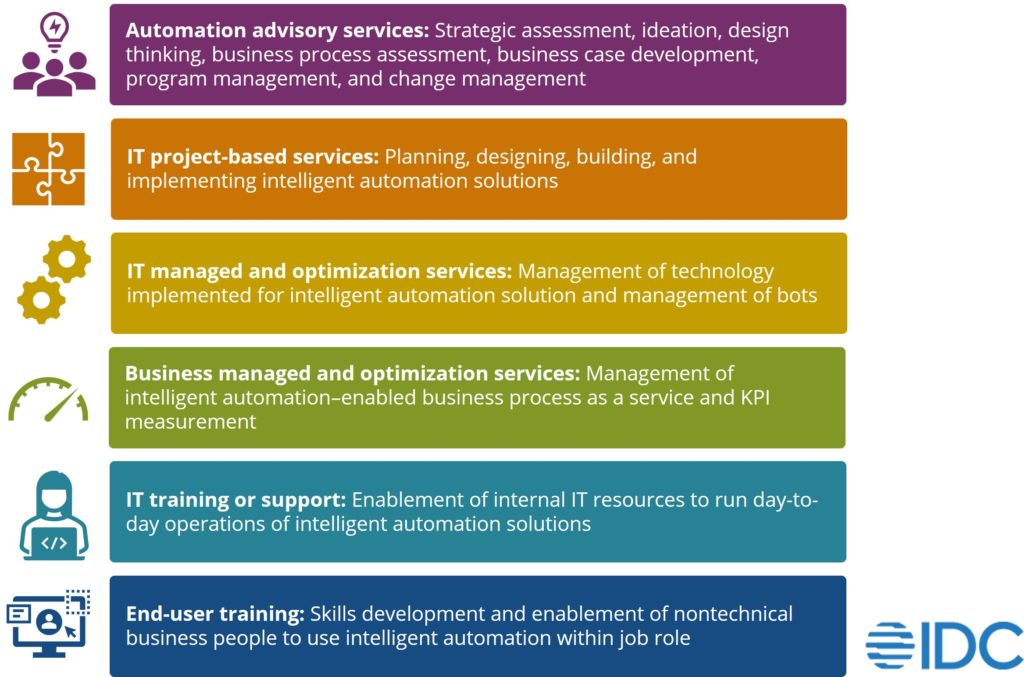The realm of intelligent automation continues to expand as enterprises look to connect information systems and process automation to improve overall enterprise intelligence. Automating knowledge work and decision environments requires a breadth of technologies and addressing broader challenges across data, processes, and people.
Our research suggests using intelligent automation is going to be critical in meeting the demand for enterprise intelligence skills of the future and keeping up with the exponential growth of data and the increasing speed of business. IDC’s August 2021 Future of Intelligence Survey indicated that more than one-third of respondents rated automation as a critically important part of increasing enterprise intelligence. In October 2021, IDC predicted that 40% of the G2000 will double the use of intelligent automation in knowledge retention, dissemination, and information synthesis by 2026, filling the skills vacuum in the data-to-insights life cycle. A more recent survey, IDC’s Future Enterprise Resiliency and Spending Survey, Wave 11, conducted in December 2021, indicated that investment in AI/ML-based automation is a nascent but highly differentiating part of enterprise intelligence initiatives.
IDC research indicates intelligent automation solutions show great potential for not only reducing costs but improving outcomes for buyers in areas such as:
- Operational efficiency
- Increasing output with the same workforce
- Resiliency and adaptability to business disruptions
- Customer experience
- Employee experience
- Revenue and profit growth
- Business model innovation
To reach these potential outcomes, organizations are investing in intelligent automation solutions that extend far beyond robotic process automation (RPA) to integrate technologies such as artificial intelligence (AI), machine learning (ML), optical character recognition (OCR), business process modeling (BPM), process and task mining, application programming interface (API) integration and management, event-driven monitoring, low-code development platforms, cloud, and enterprise applications.
Beyond constructing the foundational technology platform, our research shows organizations also need to overcome a variety of challenges to adopt intelligent automation solutions, including data quality and management issues, lack of support and maintenance resources, insufficient skills or willingness on the part of employees to use intelligent automation technologies, and unclear use cases or business benefits.
Services providers can play a key role in the success of intelligent automation initiatives by supplying technical skills and expertise in strategy, architecture, process optimization, and change management to ensure solutions deliver business value and ROI.
I recently completed an in-depth assessment of 18 vendors in the worldwide intelligent automation services market, evaluating each vendor across 52 distinct scored elements. The analysis looked at both what vendors plan to do (strategies) and their ability to deliver today (capabilities) across the full life cycle of intelligent automation services seen in the graphic below.
Intelligent Automation Services

My assessment included the perception of intelligent automation services buyers of both the key characteristics and the capabilities of the vendors evaluated. Based on phone interviews and online surveys of more than 70 organizations across industries, ten key attributes emerged as most critical to a successful engagement with an intelligent automation services provider:
- Achieving desired business outcomes
- Quality of intelligent automation skills and knowledge
- Value delivery for fee paid
- Technical insights and competency
- Proven methodologies and tools for solving customers’ issues
- Employee engagement
- Functional insights and competency
- Data quality, management, governance, and security capabilities
- ROI models and cost-benefit analysis
- Innovation capabilities
As intelligent automation increasingly becomes an integral component of digital business and enterprise intelligence strategies, services providers have evolved their portfolios and expanded their capabilities in these dimensions and several others to meet a broader range of customer needs. Successful organizations partner with providers that understand their maturity, offer appropriate solutions, and provide insight to improve intelligent automation programs and deliver better business outcomes.




